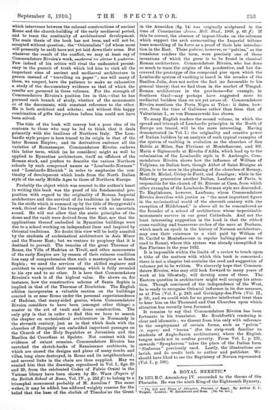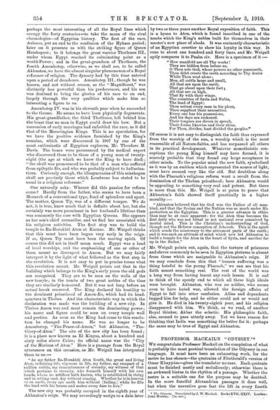A ROYAL HERETIC.*
IN 1375 B.C. Amonhotep rv. succeeded to the throne of the Pharaohs. He was the ninth King of the Eighteenth Dynasty,
E. r.
e and Times of Aklataton, Pharaoh of Egypt. By Arthur
perhaps the most interesting of all the Royal lines which occupy the forty centuries—to take the mean of the rival chronologies—of Egyptian history. The first of the race, Aahmes, put an end to the confusion of the Hyksos period ; later on it presents us with the striking figure of Queen Hatahepsut; to it belongs the great warrior Thothmes III.,
under whom Egypt reached its culminating point as a world-Power ; and in the great-grandson of Thoth:nes, the fourth Amonhotep, otherwise, as we shall see, to be called Akhnaton, we have the almost singular phenomenon of a Royal reformer of religion. The dynasty had by this time entered
upon a period of decadence. Amonhotep III., though he was known, and not without reason, as the "Magnificent," was distinctly less powerful than his predecessors, and his son was destined to bring the glories of his race to an end, largely through the very qualities which make him so interesting a figure to us.
Amonhotep IV. was in his eleventh year when he succeeded to the throne. He seems to have been physically degenerate. His great-grandfather, the third Thoth:nes, left behind him the boast that no man in Egypt could draw his bow. But a succession of early marriages had enfeebled the race, as it did that of the Merovingian Kings. This is no speculation, for we have the positive evidence furnished by the King's remains, which were discovered in 1907 by one of the most enthusiastic of Egyptian explorers, Mr. Theodore M.
Davis. The bones were pronounced by the medical expert who discovered them to be those of a young man of twenty- eight (the age at which we know the King to have died) ; the skull was pronounced to be that of a man who suffered from epileptic fits, and who was probably subject to hallucina- tions. Curiously enough, the idiosyncrasies of this misshapen skull are precisely those which Lombroso has stated to be usual in a religious reformer."
One naturally asks : Whence did this passion for reform come ? Hardly from the father, who seems to have been a Monarch of a conventional type, fond of splendour and sport. The mother, Queen Tiy, was of a different temper. We do not, it is true, know much that is definite about her, but she certainly was more prominent in her husband's lifetime than was commonly the case with Egyptian Queens. She appears as her son's chief counsellor, and we find her associated with his religious activities. The first step was to build the temple to Ra-Horakhti Aton at Karnac. Mr. Weigall thinks that this must have been begun very early in the reign.
If so, Queen Tiy must have been the moving spirit. Of course this did not in itself mean much. Egypt was a land of local worships, and the emphasising of one or other of them meant no disrespect to Amon. But we may fairly interpret it by the light of what followed as the first step in the revolution. It is not easy to put in precise terms what this revolution meant. Mr. Weigall points out that in the building which belongs to the King's early years the old gods are recognised. They are to be seen on the walls of the new teronle ; in the tombs of two great nobles of the time they are similarly honoured. But it was not long before an actual break occurred. The King declared his hostility to the dominant priesthood of Amon-Ra,, which had its head- quarters in Thebes. And the characteristic way in which the declaration was made was the building of a new city. In Thebes Amon was and must remain the dominating power; his name and figure could be seen on every temple wall and portico. As soon as the King had come to this resolu- tion he changed his name. He was no longer to be
Amonhotep, "The-Peace-of-Amon," but Akhnaton, "The- Glory-of-Aton." The site of the new city has been found ; it is a place now known as El Kinysa, about a hundred and sixty miles above Cairo ; its official name was the "City of the Horizon of Aton." Here is a passage from the Royal utterances on this occasion, as Mr. Weigall has interpreted them to us :— " As my father lia-Eforakhti Aton liveth, the great and living Aton, ordaining life, vigorous in life, my father, my rampart of a million cubits, my remembrancer of eternity, my witness of that 'which pertains to eternity, who formeth -himself with his own aaands, whom no artificer hath known, who is established in rising and in setting each day without ceasing. Whether he is in heaven or on earth, every eye seeth him without {failing,] while he fills the land with his beams and makes every face to live."
The new city was probably occupied in. the eighth year of Akhnaton's reign. We may accordingly assign to a date later by two or three years another Royal exposition of faith. This is a hymn to Aton, which is found inscribed in one of the
tombs which the King's nobles built for themselves in their master's new place of abode. It was eminently characteristic of an Egyptian courtier to show his loyalty in this way. It runs to about one hundred and forty lines, and Mr. Weigall aptly compares it to Psalm eiv. Here is a specimen of it :—
"How manifold are all Thy works !
They are hidden from before ns, 0 Thou sole God, whose powers no other poesesseth. Thou didst create the earth according to Thy desire While Thou wast alone ; Men, all cattle large and small, All that are upon the earth,
That go about upon their feet
All that are on high, That fly with their wings. The countries of Syria and Nubia, The land of Egypt ; Thou settest every man in his place,. Thou suppliest their necessities.
Every one has his possessions, And his days are reckoned.
Their tongues are divers in speech, Their forms likewise and their skins,
For Thou, divider, haat divided the peoples?'
Of course it is not easy to distinguish the faith thus expressed from the worship of the sun, a worship which is the most reasonable of all Nature-faiths, and has surpassed all others in its practical development. Whatever monotheistic con- ceptions the young King himself may have formed, it is scarcely probable that they found any large acceptance in other minds. To the popular mind the new faith, symbolised as it was by an emblem which represented the source of light, must have seemed very like the old. But doubtless along with the Pharaoh's religious reform went a revolt from the domination of the Theban priesthood ; here Akhnaton would be appealing to something very real and potent. But there is more than this. Mr. Weigall is at pains to prove that Akhnaton's faith showed itself practically in a higher morality :—
"Akhnaton believed that his God was the Father of all man- kind, and that the Syrian and the Nubian was as much under 1115 protection as the Egyptian. This is a greater advance in ethicz than may be at once apparent: for the Aton thus becomes ths first deity who was not tribal or not national ever conceived by mortal mind. This is the Christian's understanding of God, though not the Hebrew conception of Jehovah. This is the spirit which sends the missionary to the uttermost parts of the earth ; and it was such an attitude of mind which now led Akhnaton to build a temple for the Aton in the heart of Syria, and another far up in the Sudan?'
Mr. Weigall points out, again, that the torture of prisoners and slaves commonly to be seen in Egyptian pictures is absent from those which are assignable to Akhnaton's reign. If we may conclude from this that "human suffering was a thing hateful to the young Pharaoh," we can see that his faith meant something real. The rest of the world was a long way from having learnt any such lesson. It is sad to think of the speedy end to which all these high ideals were brought. Akhnaton, who was no soldier, who seems even to have hated war, allowed the foreign affairs of Egypt to fall into utter confusion. Allies and dependents begged him for help, and he either could not or would not give it. He died in his twenty-eighth year, and his religion disappeared with him. We think, as we read, of another Royal thinker, Akbar the eclectic. His philosophic faith, also, seemed to pass utterly away. Yet we have reason for thinking that India was something the better for it: perhaps the same may be true of Egypt and Akhnaton.











































 Previous page
Previous page